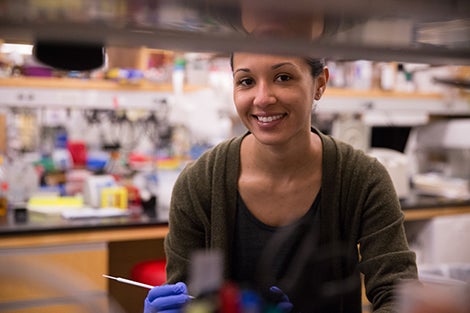May 19, 2016 — Back when she was a high school athlete, Michelle Rooks, who will graduate with her PhD in biological sciences in public health later this month, saw how making changes to her diet could improve her performance. In her research at Harvard T.H. Chan School of Public Health, Rooks has taken her interest in the connection between food, nutrition, and health to the microscopic level—she’s been working to understand the biological mechanisms that can cause bacteria in the gut to initiate and drive disease.
Cracking the code of this bacterial community—known as the gut microbiome—may ultimately lead to new treatments for diseases like inflammatory bowel disease (IBD) and colorectal cancer, as well as interventions to help keep those at risk for those diseases from getting sick.
Exploring the microbiome
While the community of bacteria we carry in our gut is unique to each individual, researchers are beginning to identify the bacterial signatures of disease. Using preclinical mouse models of IBD, Rooks has been able to pinpoint differences between gut microbiomes in remission and those with active disease. She has also studied the mechanisms that enable one particular family of bacteria, Enterobacteriaceae, to grow and exacerbate disease when its host is experiencing stress—a potentially important marker of IBD.
Creating a picture of what’s ‘normal’ and what isn’t in the gut microbiome could help physicians someday treat painful flare-ups of IBD before they occur. If a patient’s stool sample or tissues showed signs of certain changes in bacterial composition or function—termed microbial dysbiosis—a treatment could be administered to restore their gut to a healthier state.
Diet may also someday be used to help promote a healthy gut. With greater understanding of how food affects gut bacteria, doctors could potentially suggest diet modifications for individuals at risk of developing IBD and other disorders associated with microbial dysbiosis.
“We’re still a long way from that, but I think science is getting there,” Rooks said. She noted that research has shown that fiber is an important nutrient source for the gut and that there is strong epidemiological evidence linking red meat to colorectal cancer.
“We’ve just had a little glimpse so far of what’s going on in the gut microbiome, who’s who among the bacteria and what they’re doing,” said Rooks. “I love the work that I’ve done here, and there’s still so much to learn.” She hopes to continue her research on the gut microbiome after graduation, ideally for a biotech company.
A ‘thoughtful’ approach to science
Since completing her undergraduate education at Stanford University, Rooks worked in two prominent labs before enrolling at Harvard Chan, first with David Louis at Massachusetts General Hospital and then with Gregory Hannon at Cold Spring Harbor Laboratory in New York. During that time, she also earned a master’s in nutrition and public health from Columbia University.
A first-generation American—her mother is from former Yugoslavia and her father is from Trinidad and Tobago—Rooks grew up on Long Island, New York. There, her teachers recognized her passion and talents and encouraged her to continue studying math and science.
Her advisor at Harvard Chan, Wendy Garrett, Melvin J. and Geraldine L. Glimcher Associate Professor of Immunology and Infectious Diseases, calls Rooks “one of those rare individuals who seamlessly integrates computational and wet bench approaches to biology,” adding that she is “rigorous and thoughtful in her approach to science.”
Rooks now sees herself at the end of the training chapter of her career. “I want to take the skills I’ve gained and apply them to improving human health in a translational setting. Working in the biotech industry would give me access to incredible resources. It’s exciting to think about using the evolving tools and knowledge in this area to make a real impact on disease outcomes.”
Photo: Sarah Sholes
